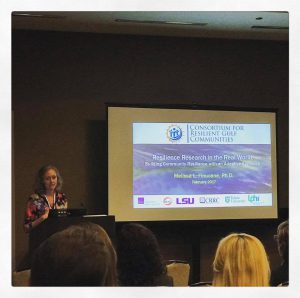
CRGC director, Melissa Finucane of the RAND Gulf States Policy Institute, discusses Building Community Resilience with an Integrated Approach at the 2017 Gulf of Mexico Oil Spill & Ecosystem Science Conference.
There are many coastal populations, who are dependent on the health and stability of their local environment. Sustaining traditional marine-based economies continue to be challenged and threatened by risk of both technological and natural disasters, such as oil spills and hurricanes, which can have vast, multidimensional impacts on the livelihood, health, and overall wellbeing of coastal residents. Past disaster response, recovery, and restoration efforts have provided opportunities to improve disaster preparedness approaches; however; it’s critical that collaboration with communities, industry, and other multidisciplinary stakeholders be a central component in disaster preparedness and recovery models going forward.
The 2017 Gulf of Mexico Oil Spill & Ecosystem Science Conference, which took place in New Orleans on February 6-9, included the
Human Dimensions of the 2010 Deepwater Horizon oil spill as a reoccurring theme in this year’s program to examine these important intersections between recovery and preparedness and the human dimensions that strengthen current efforts.
On Wednesday, February 8, the Consortium for Resilient Gulf Communities (CRGC) had a large presence during the day-long session,
Human Dimensions and Activity of Oil Spill Response, Restoration, and Future Preparedness: Interdisciplinary Communications and Community Resilience from a Social Ecological and Systems Approach. The session was designed to explore how human health, social wellbeing, demographics, and economics intersect to support community resilience. The session also examined opportunities for implementing innovative approaches and developing new models to understand how abrupt and unexpected events lead to exposure, risk, social-ecological transitions or changes in human activity patterns. Key lessons learned from Deepwater Horizon and other oil spills were also discussed, identifying gaps in knowledge and practice to formulate new research priorities, as well as outreach and education activities.
CRGC director, Melissa Finucane of the RAND Gulf States Policy Institute, and George Hobor, a CRGC co-PI from LPHI, were amongst session organizers. In addition to Dr. Finucane, seven additional members of the CRGC research team— three of which were CRGC students— gave presentations on various facets of the consortium’s recent findings during the session. Researchers and presentation topics included:
- Mental and Behavioral Health in the Gulf States 5 Years after the Deepwater Horizon Oil Spill
Rajeev Ramchand, Ph.D., Senior Behavioral and Social Scientist, RAND Corporation
- Persistent perceived vulnerability as a function of exposure to the Deepwater Horizon oil spill
Andrew M. Parker, Ph.D., Senior Behavioral & Social Scientist; Co-director of RAND Center for Decision Making under Uncertainty, RAND Corporation
- Local Ties, Natural Resource Employment, and Oil Spill Exposure: Effects on Mental Health Outcomes in Gulf Coast Communities
Vanessa Parks, Graduate Student and Research Assistant, Louisiana State University
- Estimating the Effects of the Deepwater Horizon Oil Spill on Fisheries Landings and Revenues
Jacqueline Fiore, Graduate Student and Research Assistant, Tulane University
- Assessing the Effects of Religion and Disruption on Mental Health in Vulnerable Gulf Communities
Leah Drakeford, Graduate Student and Research Assistant, Louisiana State University
- In Media we trust?: Reaching special populations in the Gulf of Mexico
Elizabeth L. Petrun Sayers, Ph.D., Associate Behavioral and Social Scientist, RAND Corporation
- Utilizing Lay Health Workers to Increase Community Resilience by Expanding Social Networks and Building Social Capital
Brandi Gilliam, MPA, Program Specialist, Coastal Resource and Resiliency Center, University of South Alabama
- Resilience Research in the Real World: Building Community Resilience with an Integrated Approach
Melissa L. Finucane, Ph.D., Senior Social and Behavioral Scientist; Professor, Pardee RAND Graduate School, RAND Corporation

